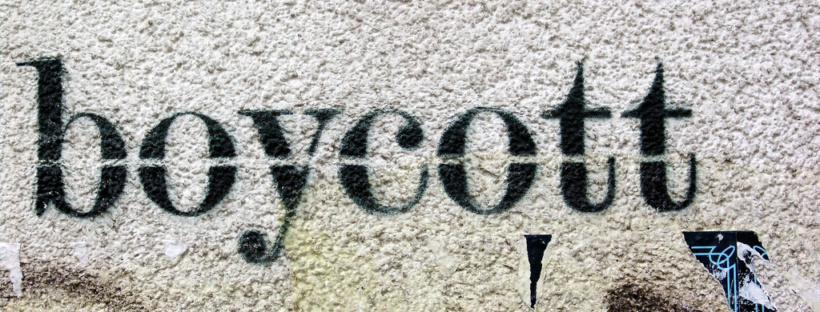The Jewish Ethicist: Educational Embargo
from aish.com
by Rabbi Dr. Asher Meir, Business Ethics Center of Jerusalem
Q. A local retail chain treats the clerks inhumanely. Should we avoid buying there?
A. Previous columns have discussed two kinds of boycott: a boycott undertaken in order to counter price-gouging or avoiding a merchant because of his overall ethical behavior .
The first is perfectly legitimate because the customers are defending their own interest. The main ethical consideration is to adequately document that price-gouging is actually present; otherwise, the boycott baselessly deprives a merchant of his livelihood. Another relevant consideration is equity: if many merchants are equally culpable for a particular behavior, it’s not fair to arbitrarily single out one for action.
The second case is not really a boycott but rather an acknowledgment that business relationships are also human relationships, and there are some people we don’t want to dignify with such a relationship. Here the main ethical consideration is not to judge a person hastily; perhaps views or behavior that we at first consider illegitimate are merely strange or unfamiliar.
Nowadays the most common kind of boycott is the kind mentioned in the question — to convince a merchant to change one specific kind of conduct. Common examples are treatment of workers and damage to the environment. Of course this kind of boycott shares the ethical considerations we mentioned in the past: we should verify that the conduct exists and is really worthy of censure. But there are also additional considerations.
The main objective of such a boycott is a constructive, educational one — to create awareness of a particular social problem and to work to rectify it. Therefore, organizers of this kind of boycott have an extra responsibility to carry out their activities in a constructive, educational manner. The objective, after all, is not to harm the merchant but on the contrary to encourage them to adopt more enlightened policies.
From a Jewish point of view, we would view such a boycott as a kind of tokhechah — a term which is often translated as to reprove, but I prefer to translate it as to improve . The concern of the Torah in the mitzvah of reproof is not primarily to eliminate the negative behavior, but rather to show genuine concern for the transgressor himself. The verse states, Don’t hate your brother in your heart; surely reprove your brother, and don’t bear sin towards him (Leviticus 19:17). The main consideration is the human relationship towards the transgressor: not to hate him; to acknowledge the basis of brotherhood; and to be careful not to sin ourselves in giving rebuke. To round out the picture, the end of the very next verse admonishes, Love your fellow as yourself.
So in a boycott of this nature, every effort should be made to maintain constructive relations with the firm. Before actually announcing a boycott, demands should be clearly defined and publicized, and efforts should be made to meet with management to discuss ways to solve the problem. If these are not successful, then a boycott is a legitimate tool, but organizers should avoid an excessively adversarial approach. A bitter campaign will dilute or even contradict the underlying ethical message of the boycott.
Finally, organizers should recognize that education is a two-way street. Many commentators explain that one of the purposes of rebuke is to give the suspected transgressor an opportunity to explain his behavior; perhaps there are valid reasons for the firm’s behavior.
A boycott is a legitimate and valuable educational tool to increase awareness of various social problems and to create incentives to solve them. But educational goals can be achieved only through educational means: insistence on equity and transparency; maintaining a constructive and not adversarial approach; and a willingness to learn as well as to teach.
